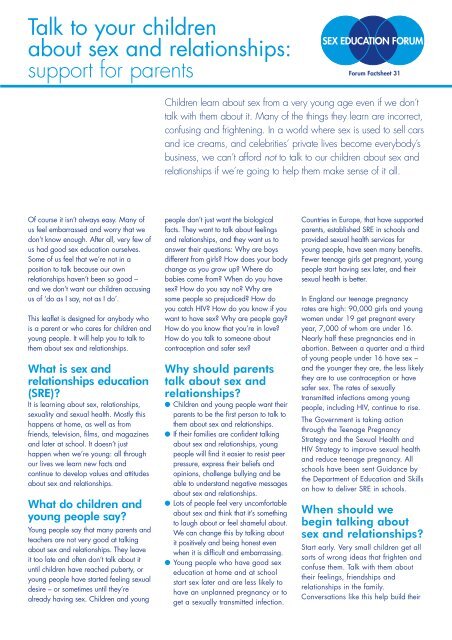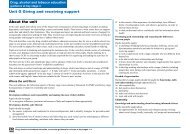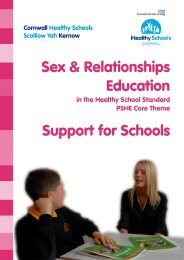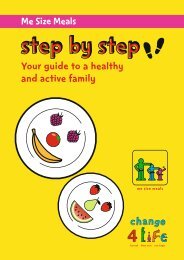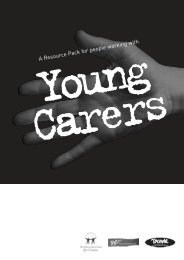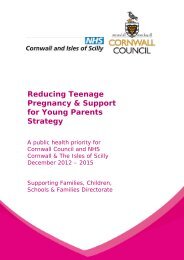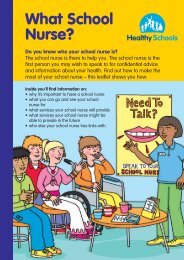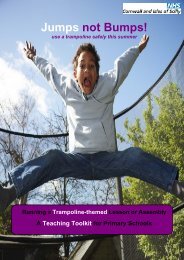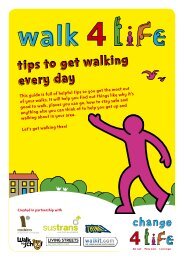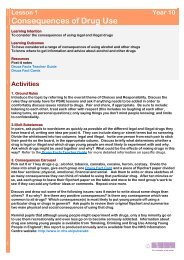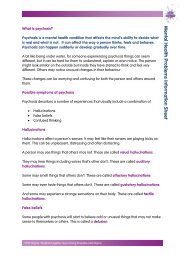Talk to your children about sex and relationships: support for parents
Talk to your children about sex and relationships: support for parents
Talk to your children about sex and relationships: support for parents
Create successful ePaper yourself
Turn your PDF publications into a flip-book with our unique Google optimized e-Paper software.
<strong>Talk</strong> <strong>to</strong> <strong>your</strong> <strong>children</strong><strong>about</strong> <strong>sex</strong> <strong>and</strong> <strong>relationships</strong>:<strong>support</strong> <strong>for</strong> <strong>parents</strong>Forum Factsheet 31Children learn <strong>about</strong> <strong>sex</strong> from a very young age even if we don’ttalk with them <strong>about</strong> it. Many of the things they learn are incorrect,confusing <strong>and</strong> frightening. In a world where <strong>sex</strong> is used <strong>to</strong> sell cars<strong>and</strong> ice creams, <strong>and</strong> celebrities’ private lives become everybody’sbusiness, we can’t af<strong>for</strong>d not <strong>to</strong> talk <strong>to</strong> our <strong>children</strong> <strong>about</strong> <strong>sex</strong> <strong>and</strong><strong>relationships</strong> if we’re going <strong>to</strong> help them make sense of it all.Of course it isn’t always easy. Many ofus feel embarrassed <strong>and</strong> worry that wedon’t know enough. After all, very few ofus had good <strong>sex</strong> education ourselves.Some of us feel that we’re not in aposition <strong>to</strong> talk because our own<strong>relationships</strong> haven’t been so good –<strong>and</strong> we don’t want our <strong>children</strong> accusingus of ‘do as I say, not as I do’.This leaflet is designed <strong>for</strong> anybody whois a parent or who cares <strong>for</strong> <strong>children</strong> <strong>and</strong>young people. It will help you <strong>to</strong> talk <strong>to</strong>them <strong>about</strong> <strong>sex</strong> <strong>and</strong> <strong>relationships</strong>.What is <strong>sex</strong> <strong>and</strong><strong>relationships</strong> education(SRE)?It is learning <strong>about</strong> <strong>sex</strong>, <strong>relationships</strong>,<strong>sex</strong>uality <strong>and</strong> <strong>sex</strong>ual health. Mostly thishappens at home, as well as fromfriends, television, films, <strong>and</strong> magazines<strong>and</strong> later at school. It doesn’t justhappen when we’re young: all throughour lives we learn new facts <strong>and</strong>continue <strong>to</strong> develop values <strong>and</strong> attitudes<strong>about</strong> <strong>sex</strong> <strong>and</strong> <strong>relationships</strong>.What do <strong>children</strong> <strong>and</strong>young people say?Young people say that many <strong>parents</strong> <strong>and</strong>teachers are not very good at talking<strong>about</strong> <strong>sex</strong> <strong>and</strong> <strong>relationships</strong>. They leaveit <strong>to</strong>o late <strong>and</strong> often don’t talk <strong>about</strong> ituntil <strong>children</strong> have reached puberty, oryoung people have started feeling <strong>sex</strong>ualdesire – or sometimes until they’realready having <strong>sex</strong>. Children <strong>and</strong> youngpeople don’t just want the biologicalfacts. They want <strong>to</strong> talk <strong>about</strong> feelings<strong>and</strong> <strong>relationships</strong>, <strong>and</strong> they want us <strong>to</strong>answer their questions: Why are boysdifferent from girls? How does <strong>your</strong> bodychange as you grow up? Where dobabies come from? When do you have<strong>sex</strong>? How do you say no? Why aresome people so prejudiced? How doyou catch HIV? How do you know if youwant <strong>to</strong> have <strong>sex</strong>? Why are people gay?How do you know that you’re in love?How do you talk <strong>to</strong> someone <strong>about</strong>contraception <strong>and</strong> safer <strong>sex</strong>?Why should <strong>parents</strong>talk <strong>about</strong> <strong>sex</strong> <strong>and</strong><strong>relationships</strong>?● Children <strong>and</strong> young people want their<strong>parents</strong> <strong>to</strong> be the first person <strong>to</strong> talk <strong>to</strong>them <strong>about</strong> <strong>sex</strong> <strong>and</strong> <strong>relationships</strong>.● If their families are confident talking<strong>about</strong> <strong>sex</strong> <strong>and</strong> <strong>relationships</strong>, youngpeople will find it easier <strong>to</strong> resist peerpressure, express their beliefs <strong>and</strong>opinions, challenge bullying <strong>and</strong> beable <strong>to</strong> underst<strong>and</strong> negative messages<strong>about</strong> <strong>sex</strong> <strong>and</strong> <strong>relationships</strong>.● Lots of people feel very uncom<strong>for</strong>table<strong>about</strong> <strong>sex</strong> <strong>and</strong> think that it’s something<strong>to</strong> laugh <strong>about</strong> or feel shameful <strong>about</strong>.We can change this by talking <strong>about</strong>it positively <strong>and</strong> being honest evenwhen it is difficult <strong>and</strong> embarrassing.● Young people who have good <strong>sex</strong>education at home <strong>and</strong> at schoolstart <strong>sex</strong> later <strong>and</strong> are less likely <strong>to</strong>have an unplanned pregnancy or <strong>to</strong>get a <strong>sex</strong>ually transmitted infection.Countries in Europe, that have <strong>support</strong>ed<strong>parents</strong>, established SRE in schools <strong>and</strong>provided <strong>sex</strong>ual health services <strong>for</strong>young people, have seen many benefits.Fewer teenage girls get pregnant, youngpeople start having <strong>sex</strong> later, <strong>and</strong> their<strong>sex</strong>ual health is better.In Engl<strong>and</strong> our teenage pregnancyrates are high: 90,000 girls <strong>and</strong> youngwomen under 19 get pregnant everyyear, 7,000 of whom are under 16.Nearly half these pregnancies end inabortion. Between a quarter <strong>and</strong> a thirdof young people under 16 have <strong>sex</strong> –<strong>and</strong> the younger they are, the less likelythey are <strong>to</strong> use contraception or havesafer <strong>sex</strong>. The rates of <strong>sex</strong>uallytransmitted infections among youngpeople, including HIV, continue <strong>to</strong> rise.The Government is taking actionthrough the Teenage PregnancyStrategy <strong>and</strong> the Sexual Health <strong>and</strong>HIV Strategy <strong>to</strong> improve <strong>sex</strong>ual health<strong>and</strong> reduce teenage pregnancy. Allschools have been sent Guidance bythe Department of Education <strong>and</strong> Skillson how <strong>to</strong> deliver SRE in schools.When should webegin talking <strong>about</strong><strong>sex</strong> <strong>and</strong> <strong>relationships</strong>?Start early. Very small <strong>children</strong> get allsorts of wrong ideas that frighten <strong>and</strong>confuse them. <strong>Talk</strong> with them <strong>about</strong>their feelings, friendships <strong>and</strong><strong>relationships</strong> in the family.Conversations like this help build their
2 TALK TO YOUR CHILDREN ABOUT SEX AND RELATIONSHIPSconfidence in talking <strong>about</strong> feelings <strong>and</strong><strong>relationships</strong> – <strong>and</strong> in the years <strong>to</strong> comewill help them <strong>to</strong> make sensible decisions<strong>about</strong> <strong>sex</strong> <strong>and</strong> <strong>relationships</strong>. Use propernames <strong>for</strong> the body parts, <strong>and</strong> answerquestions truthfully <strong>and</strong> briefly. Childrenhate lectures – if they want morein<strong>for</strong>mation they will ask anotherquestion. ‘Where did you get me’? Canbe answered by saying, ‘you grew in aspecial place in mummy’s tummy’. A fewyears later you may be asked by anincredulous 10 year old: ‘Why dopeople have <strong>sex</strong>’? And the responsecould be: ‘grown ups like <strong>to</strong> do itbecause it feels nice, it’s a way ofshowing love <strong>and</strong> it can make babies’.Without frightening them make sure thatthey underst<strong>and</strong> that they can say ‘no’ <strong>to</strong>someone who is <strong>to</strong>uching them orapproaching them in a way that makesthem feel unhappy or uncom<strong>for</strong>table.They must also be assured that ifsomething like this happens it is right <strong>to</strong>tell someone <strong>and</strong> ask <strong>for</strong> help.How do I get started?● First prepare <strong>your</strong>self – talk with<strong>your</strong> partner, friends <strong>and</strong> relatives <strong>to</strong>build up <strong>your</strong> confidence.● Read a book or leaflet aimed at<strong>your</strong> child’s age group <strong>to</strong> increase<strong>your</strong> knowledge, <strong>and</strong> help you findwords <strong>and</strong> a style you’recom<strong>for</strong>table with.How <strong>to</strong> talk with<strong>children</strong> <strong>and</strong> youngpeople <strong>about</strong> values<strong>and</strong> moralityThe family has a major role indeveloping a child’s values <strong>and</strong>attitudes <strong>to</strong> <strong>sex</strong> <strong>and</strong> <strong>relationships</strong>.Close loving <strong>relationships</strong> are the bestway of showing a child or youngperson how <strong>your</strong> family ‘does things’,based on <strong>your</strong> values, culture, faith<strong>and</strong> beliefs. Research across the worldconfirms that telling young people <strong>to</strong>‘say no’ doesn’t work. Young peopleSome Dos <strong>and</strong> Don’tsDo● Read books, leaflets or watch a video with <strong>your</strong> child.● <strong>Talk</strong> while you’re doing something else – washing up, driving in the car orfishing.● Enjoy it. Laugh with each other, not at each other – it can reduceembarrassment <strong>and</strong> stress.● Listen rather than judge. Try asking them what they think?● Answer questions <strong>and</strong> don’t be afraid <strong>to</strong> say: ‘I really don’t know – let’swork it out or look it up <strong>to</strong>gether’. Have a phrase <strong>for</strong> awkward moments,such as: ‘That’s a good question, but let’s talk <strong>about</strong> it once we get home’(then make sure you do!).● Always respond, if you don’t, she or he may think it is wrong <strong>to</strong> talk <strong>to</strong> you<strong>about</strong> <strong>sex</strong> <strong>and</strong> <strong>relationships</strong> <strong>and</strong> as a result you may find <strong>your</strong> child clamsup when you raise the subject.● If it all feels <strong>to</strong>o personal, try talking <strong>about</strong> people in books, films <strong>and</strong>favourite television programmes such as soaps.Don’t● Bombard <strong>your</strong> child with questions or talk <strong>to</strong>o much. Many <strong>children</strong> say it isawful <strong>to</strong> get the <strong>for</strong>mal lecture on <strong>sex</strong> or questions fired at them. ‘I asked aquestion <strong>and</strong> she immediately came back with “Are you having <strong>sex</strong> then?” Try<strong>and</strong> hold on <strong>to</strong> <strong>your</strong> anxieties, answer the question, <strong>and</strong> respect privacy.Young people go through phases of wanting <strong>to</strong> be private. It’s better <strong>to</strong> keeptheir trust than antagonise or alienate them.● Be afraid <strong>to</strong> tell <strong>children</strong> what you think, <strong>and</strong> why. But do try <strong>and</strong> avoidmaking harsh judgements of others <strong>and</strong> give <strong>your</strong> child some leeway <strong>to</strong>come <strong>to</strong> their own opinions.don’t always want <strong>to</strong> be <strong>to</strong>ld what <strong>to</strong>do but they are interested in talking<strong>about</strong> what is right <strong>and</strong> wrong.Conversations need <strong>to</strong> be relaxed,realistic <strong>and</strong> relevant <strong>to</strong> youngpeople’s life experiences.What do schools do<strong>about</strong> <strong>sex</strong> <strong>and</strong><strong>relationships</strong>education?In the early years up <strong>to</strong> the age of 7,teachers will be helping <strong>children</strong> <strong>to</strong>develop the skills of listening <strong>and</strong>caring as well as talking <strong>about</strong>feelings <strong>and</strong> their <strong>relationships</strong> withfamilies <strong>and</strong> friends. Children willlearn the names of the body parts, thedifferences between male <strong>and</strong> female<strong>and</strong> the ways in which they willdevelop <strong>and</strong> grow. Importantly, theywill also learn <strong>to</strong> recognise unsafe <strong>and</strong>risky situations, <strong>and</strong> <strong>to</strong> ask <strong>for</strong> help.'We address the bodily changes<strong>children</strong> are going through as theyreach the age of 9 <strong>and</strong> 10 because<strong>children</strong> are maturing earlier now'primary school head teacherFrom 7 <strong>to</strong> 18 years they will continue <strong>to</strong>develop their knowledge <strong>and</strong> skills. Inagreement with <strong>parents</strong>, <strong>children</strong> will beprepared <strong>for</strong> the physical <strong>and</strong> emotionalchanges of puberty <strong>and</strong> learn <strong>about</strong>reproduction <strong>and</strong> <strong>sex</strong>ual behaviour. Theywill also learn <strong>about</strong> <strong>relationships</strong>,<strong>sex</strong>uality, contraception <strong>and</strong> safer <strong>sex</strong>,including the importance of family,marriage <strong>and</strong> stable long-term<strong>relationships</strong> <strong>for</strong> the care <strong>and</strong> <strong>support</strong> of
TALK TO YOUR CHILDREN ABOUT SEX AND RELATIONSHIPS 3<strong>children</strong>. They will also learn social skills,which will help them <strong>to</strong> be assertive, askquestions, access <strong>support</strong>, negotiatewithin <strong>relationships</strong>, problem solve <strong>and</strong>make <strong>and</strong> carry out decisions.There are laws which ensure that SRE isdelivered within a moral framework thatvalues the diversity of family life. TheGovernment has given guidance <strong>to</strong> eachschool on how they should teach SRE <strong>to</strong>ensure that it works by improving <strong>sex</strong>ualheath <strong>and</strong> well-being, reducing teenagepregnancy <strong>and</strong> delaying first <strong>sex</strong>.All schools are expected <strong>to</strong> join theirlocal accredited Healthy Schoolsscheme. This offers a process thatensures SRE is planned in partnershipwith <strong>parents</strong>, pupils <strong>and</strong> school nurses.How can <strong>parents</strong> helpschools?Schools review their SRE policy on aregular basis. They are encouraged <strong>to</strong>work in partnership with <strong>parents</strong>. Askthe teachers if you can help. Read thepolicy <strong>and</strong> look at some of theresources. Parent Teacher Associationsor Boards of Governors have meetingson SRE. Try <strong>to</strong> attend them, <strong>and</strong> helpthe school <strong>to</strong> plan good <strong>sex</strong> <strong>and</strong><strong>relationships</strong> education. In some areas,<strong>parents</strong> have been trained as peer <strong>sex</strong>educa<strong>to</strong>rs so they can help other<strong>parents</strong> <strong>to</strong> talk with <strong>children</strong> <strong>and</strong>young people <strong>about</strong> <strong>sex</strong> <strong>and</strong><strong>relationships</strong>. Parents can test outleaflets <strong>and</strong> videos at home, conduct asurvey <strong>to</strong> work out what everybody –both <strong>parents</strong> <strong>and</strong> pupils – expect ofSRE in school <strong>and</strong> give classroom talks<strong>about</strong> being a parent.What happens if I amnot happy with SREprovided in ourschool?It is very rare that <strong>parents</strong> are unhappywith SRE in school. Most concerns arefounded on misunderst<strong>and</strong>ing ratherthan complete disagreement. Wherethere are concerns, difficulties can oftenbe resolved by making an appointment<strong>to</strong> talk with the Personal Social HealthEducation (PSHE) <strong>and</strong> CitizenshipCoordina<strong>to</strong>r in school. Be prepared <strong>to</strong>express <strong>your</strong> view <strong>and</strong> hear the views ofteachers <strong>and</strong> governors. And mostimportantly, listen <strong>to</strong> what <strong>your</strong> childthinks. Parents of some cultures <strong>and</strong>faiths have expressed concerns thatboys <strong>and</strong> girls are taught <strong>to</strong>gether.Where this has happened the schoolhas resolved it, by making arrangements<strong>to</strong> deliver the more private aspects ofSRE in single <strong>sex</strong> groups.In the rare event that you are still notsatisfied, you have the right <strong>to</strong> withdraw<strong>your</strong> child from certain lessons or thewhole programme provided within PSHE<strong>and</strong> Citizenship. The reproductiveelements of SRE are often delivered inScience <strong>and</strong> <strong>children</strong> cannot bewithdrawn from a National Curriculumsubject. You will need <strong>to</strong> notify the Chairof Governors <strong>and</strong> the school will makeseparate arrangements <strong>for</strong> <strong>your</strong> child.Think carefully <strong>about</strong> how <strong>your</strong> child willget the right in<strong>for</strong>mation <strong>and</strong> educationbe<strong>for</strong>e you withdraw <strong>your</strong> childcompletely. It is usually better <strong>to</strong> hearsomething from a teacher than hear it inthe playground.What laws <strong>about</strong> <strong>sex</strong>affect young people?Young people cannot legally consent<strong>to</strong> <strong>sex</strong> until they are 16. TheDepartment of Health <strong>and</strong> medicalprofessional guidelines require doc<strong>to</strong>rs<strong>to</strong> offer all patients, including youngpeople under 16, a confidentialservice. They always encourage youngpeople <strong>to</strong> talk with their <strong>parents</strong>, butthey are able <strong>to</strong> give confidentialcontraceptive advice <strong>and</strong> treatment ifthey believe the young person willhave <strong>sex</strong> anyway <strong>and</strong> endanger their<strong>sex</strong>ual health. Doc<strong>to</strong>rs are required <strong>to</strong>use their professional judgement <strong>to</strong>assure themselves that the youngperson is mature enough <strong>to</strong> underst<strong>and</strong>contraceptive treatment. They are onlyable <strong>to</strong> break confidence in veryspecific circumstances, such assuspected <strong>sex</strong>ual abuse.Who should betalking <strong>about</strong> <strong>sex</strong> <strong>and</strong><strong>relationships</strong>?Fathers as well as mothers need <strong>to</strong> talk<strong>about</strong> <strong>sex</strong>. Mothers talk more <strong>to</strong> girls,<strong>and</strong> often boys feel left out. If we wantyoung men <strong>to</strong> take responsibility <strong>for</strong>their <strong>sex</strong>ual behaviour we need <strong>to</strong>offer them <strong>support</strong>. One young mancommented: ‘The moment it looked asif the conversation was going that wayDad was up <strong>and</strong> out saying he had <strong>to</strong>mow the lawn,’ while another said: ‘Itwas great. They didn’t always knowthe answers but Mum <strong>and</strong> Dad werealways willing <strong>to</strong> talk with us <strong>about</strong> it.’Gr<strong>and</strong><strong>parents</strong> can play an importantrole by recalling how it was <strong>for</strong> themwhen they were younger. Aunties areoften good at talking <strong>about</strong> thesematters with their nephews <strong>and</strong> nieces.Step<strong>parents</strong> <strong>and</strong> foster <strong>parents</strong> shouldalso be willing <strong>to</strong> answer questions<strong>and</strong> involve themselves in familydiscussions <strong>about</strong> <strong>sex</strong> <strong>and</strong><strong>relationships</strong>, <strong>and</strong> of course teachers<strong>and</strong> school nurses will talk <strong>to</strong> <strong>children</strong><strong>and</strong> young people in school.My child has adisability. How shouldI talk <strong>about</strong> <strong>sex</strong> <strong>and</strong><strong>relationships</strong>?Children with learning <strong>and</strong>/or physicaldisabilities need exactly the same <strong>sex</strong><strong>and</strong> <strong>relationships</strong> education as all<strong>children</strong>, but it may need <strong>to</strong> beexplained more simply <strong>and</strong> moreoften. It is also important because theymay be more vulnerable <strong>to</strong> abuse <strong>and</strong>exploitation. There are some extremelyuseful resources <strong>to</strong> get you started (seesources of <strong>support</strong>, below).
4 TALK TO YOUR CHILDREN ABOUT SEX AND RELATIONSHIPSWhat if my son ordaughter is gay?Even though it may be hard <strong>for</strong> you it isimportant that you don’t express strongnegative feelings because <strong>your</strong> childwill need <strong>your</strong> acceptance <strong>and</strong> love<strong>and</strong> positive messages from you thatbeing gay is fine. Gay <strong>children</strong> <strong>and</strong>young people are often bullied verbally<strong>and</strong> physically, in <strong>and</strong> out of school.We need <strong>to</strong> challenge prejudicebecause it damages the self-esteem <strong>and</strong>emotional development of the child whois bullied – as well as the bulliesthemselves. There is in<strong>for</strong>mation <strong>and</strong><strong>support</strong> available both <strong>for</strong> you <strong>and</strong> <strong>your</strong>child (see sources of <strong>support</strong>).I’m a foster parent,<strong>and</strong> some of the<strong>children</strong> I look afterhave been <strong>sex</strong>uallyabused. What shouldI do?Everything in this leaflet is relevant <strong>to</strong>you, but the <strong>children</strong> you’re lookingafter may find that talking <strong>about</strong> <strong>sex</strong>brings up traumatic memories. Thismeans you have <strong>to</strong> build their trust first.They may not know as much <strong>about</strong> <strong>sex</strong>as you think – <strong>and</strong> past abuse maymean they’ll be more open <strong>to</strong> abusive<strong>relationships</strong> in the future. Reassurethem that the abuse was not their fault,be very boundaried <strong>and</strong> let them knowyou recognise how painful it is <strong>for</strong>them. Make sure you get specialist<strong>support</strong> from the social worker, whomay be able <strong>to</strong> offer training or leaflets<strong>for</strong> you <strong>and</strong> the <strong>children</strong>.I’m on my own with ason <strong>and</strong> a daughter;do I need <strong>to</strong> doanything different?No, you may feel it’s harder becauseyou can’t share the responsibility. Try<strong>and</strong> make sure that <strong>your</strong> <strong>children</strong> cantalk with trusted family members <strong>and</strong>friends of both <strong>sex</strong>es.I feel I’ve left it <strong>to</strong>olate <strong>to</strong> start talking<strong>about</strong> <strong>sex</strong> <strong>and</strong><strong>relationships</strong>It’s never <strong>to</strong>o late. Why not start nowby talking <strong>about</strong> this leaflet?Sources of <strong>support</strong>There are many books, leaflets <strong>and</strong>some videos on <strong>sex</strong> <strong>and</strong> <strong>relationships</strong>,aimed at all ages. They can beborrowed from schools or publiclibraries, or bought from <strong>your</strong> localhigh street book shop. Attend schoolmeetings <strong>and</strong> events, which will talk<strong>about</strong> SRE. You’ll find that most<strong>parents</strong> are ‘like you’ trying <strong>to</strong> do thebest <strong>for</strong> their child. The followingorganisations offer in<strong>for</strong>mation,helplines, leaflets, <strong>and</strong> books <strong>and</strong> insome cases a mail order service.BrookTelephone: 0800 0185023 (<strong>for</strong>local in<strong>for</strong>mation)FFLAG (Families <strong>and</strong> Friends ofLesbians <strong>and</strong> Gays)Helpline: 01454 852 418E-mail: info@fflag.org.ukWebsite: www.fflag.org.ukfpa (<strong>for</strong>mally Family PlanningAssociation)Helpline: 0845 310 1334Monday <strong>to</strong> Friday 9am <strong>to</strong> 7pmwww.fpa.org.ukParenting Education <strong>and</strong>Support ForumIn<strong>for</strong>mation Service: 020 7284 8388E-mail: pesf@dial.pipex.comWebsite: www.parenting<strong>for</strong>um.org.ukParentline PlusHelpline: 0808 800 2222Monday <strong>to</strong> Friday 9am <strong>to</strong> 9pmSaturday 9.30am <strong>to</strong> 5pmSunday 10am <strong>to</strong> 3pmWebsite: www.parentlineplus.org.ukPublished by the National Children's Bureau as part of the SPOTLIGHT series.Registered Charity 258825. 8 Wakley Street, London EC1V 7QE.Sex Education ForumTel: 020 7843 1901 Fax: 020 7843 6053 E-mail: <strong>sex</strong>ed<strong>for</strong>um@ncb.org.ukWebsite: www.ncb.org.uk/sef© National Children’s Bureau Oc<strong>to</strong>ber 2003


